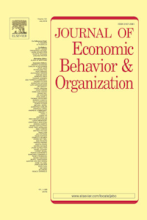When forming expectations and making financial decisions, do economic agents use their social interactions to augment their information sets and learn from them?
While there is growing evidence on the importance of peer effects for subjective expectation formation and financial decision-making, disentangling empirically the aforementioned channel from other channels such as pure imitation, transfer of norms, herding, etc., is not straightforward. Yet, this is important for assessing whether social networks mainly reduce information costs or spread aspects of financial culture through imitation and comparison. In this project, we hypothesize and test whether and to what extent social networks are used for disseminating information relevant for expectations formation and financial decision-making.
The background to our project is provided by the intersection between three research lines that have so far been developed independently, but all explore the role of interactions across economic agents. The first strand explores conditions under which interactions can lead (or not) to belief consensus and therefore provide (or not) resilience to the system. The second research line, of an essentially empirical nature, has developed novel methods to measure individual beliefs and understand their role in individual decision making. The third line has studied empirically the relevance of social interactions for household asset and debt behaviour. Each strand is represented by one of the three project participants.
The central aims of this project are the following: First, we will implement and refine empirical methods in order to characterize agents’ belief formation processes and identify the social interaction component. Second, we will provide a theoretical characterization of the social interaction component, as applied to household financial behaviour (e.g. in markets for financial and real assets, mortgage debt, etc.). If empirically relevant, we will quantitatively assess the importance of the interaction component on individual financial decision making and its (actual or potential) contribution to financial crises. Specifically, this project will (i) design and collect primary novel survey data on the importance of social interactions and financial network structure, complementing a unique survey-based longitudinal dataset in France (Taylor Nelson-Sofres ‘Mode de vie des Français’ survey); (ii) exploit the survey data to understand whether and how households update individual information sets by acquiring and processing financial information through social interactions; and (iii) the extent to which information acquired from/through social interactions influences household financial decisions through its impact on expectations.
In line with the goals of the Keynes Fund, this project focuses on important questions in valuing the effects of expectations and information constraints on households’ financial choices. The focus on whether and how expectations are revised will inform debates and practice about the spread and impact of the financial crisis and provide insights to public decision makers, regarding macroeconomic stabilisation, as well as to financial sector practitioners, regarding potential future developments in the demand for financial products and for relevant information. Our most general contribution will be to assess quantitatively the responsiveness of individual financial behavior and individual information sets to social interactions, within a network structure. As a result, the research has the potential to inform the design of government policy through greater understanding of the main factors that can trigger financial panics, frenzies or crashes.
**co-financed with CERF
Informative Social Interactions
Informative Social Interactions, Luc Arrondel, Hector Calvo-Pardo, Chryssi Giannitsarou and Michael Haliassos, Journal of Economic Behavior and Organization, Vol. 203 pp. 246-263 (2022)
Household finances are confidential and discussions are limited to a subset of peers. We collect novel representative survey data to examine separately whether interactions with inner and outer social circles influence return perceptions, expectations, and exposure to a widely known financial instrument in a developed economy with multiple information sources. We find that a respondent's connectedness, proxied by perceived prevalence of information or participation in the small financial circle, improves expectation accuracy indirectly, through boosting accuracy of perceived past returns; and influences stock participation and exposure not only by influencing expectations, but also directly.


